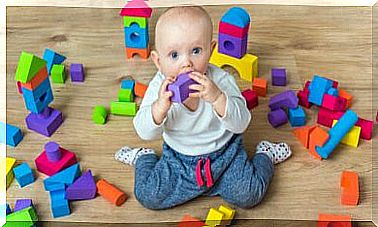I Do It Too: I Sing To My Baby

The song of a lullaby, that melody that a mother evokes in a low voice and between whispers with her child in her arms has notable benefits in the baby’s brain and emotional development. Something that has always been done almost instinctively, contains a wonderful purpose and reason for being.
Let’s admit it…. Who has not done this at some time? Both mom and dad do it often while rocking the child, they sing in a very low voice, almost indefinable, some perhaps invented melody, random words with a rhythm and a cadence that almost by magic, ends up calming the baby and plunging it into a calm and restful sleep.
It’s not magic, singing is actually an auditory stimulus with multiple implications for a young child’s own auditory and language maturation. Today in “You are Mom” we talk about it.
Singing: a powerful food for the child’s brain
That music relaxes is something we all know, however … can a baby understand music, lyrics, notes, times, silences and melodies?
Not really, but we cannot forget that the human brain also has that area in charge of processing and understanding musical stimuli, in fact, there are many studies that explain the intimate relationship between early musical learning and adequate competence in the area of music. the maths.
However, let’s go by steps. Let’s talk about those lullabies and those songs that we often automatically evoke when we hold the baby in our arms or are breast-feeding or bottle-feeding.
Can it really be so beneficial for the child’s brain that we sing to him? Of course, and these are the reasons.

Singing relaxes them
A relaxed voice, without differences in tone and that knows how to convey calm and affection in its intonation, relaxes. If the mother’s voice is in itself a significant stimulus for a child, we cannot be surprised that a lullaby song or a simple song acts in the same way: calming tears, alleviating fears and transmitting affection.
A better emotional connection
In a stressful situation, when the baby is upset, restless or has started a very intense cry, do not hesitate to do it, to sing softly, in a relaxed way.
Negative emotions are soothed by the sound of music or a song, favoring a connection of relief and calm.
We improve the baby’s self-esteem
How does singing to a child help develop their self-esteem? In a very interesting and wonderful way:
- Singing establishes an auditory and visual connection between mother and child.
- That moment of mutual attention that captures the baby’s interest so much, encourages him to feel cared for. That voice is directed at him, that song makes him feel good and therefore he feels protected and comforted.
- All this favors your self-esteem and above all, that your brain feels relaxed, free of that stress that, for example, generates fear or the feeling of abandonment.
Language development

The song is characterized by having a tone, a rhythm and words that are articulated in a slower and more meaningful way. If everything that we say to the baby in each moment is already established in its development of language, singing also generates wonderful stimulation.
This type of musical cadence favors the creation of new neural connections in that brain area that not only encourages the awakening of language, but also logic and mathematics.
We improve your diet
Curious but true. When we say that we too sing to our baby, whoever listens to us instantly visualizes us singing a lullaby so that the child falls asleep. However, the time we use songs the most is during feeding.
Whether while we breastfeed or bottle, it is common to hum a melody, traditional, current or even invented . It is something almost automatic, natural in many mothers and fathers, because in this way, we relax and connect with the child to guide him towards what is important: food.

To conclude, if you have ever surprised yourself singing to your baby, going out of tune but engrossed in that kind, sweet song that makes your child smile, do not be surprised . When we are parents our brain changes and that sixth sense of parenting emerges, there where things as simple as rocking them, imitating their babbling, singing to them or speaking through expressive gestures favors their development in an incredible way.









